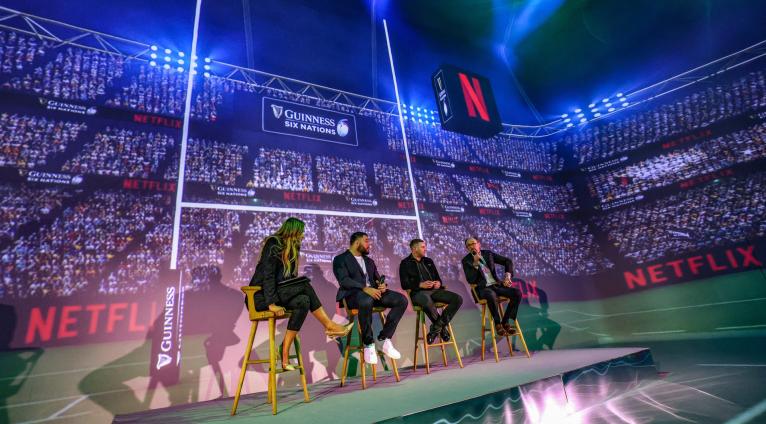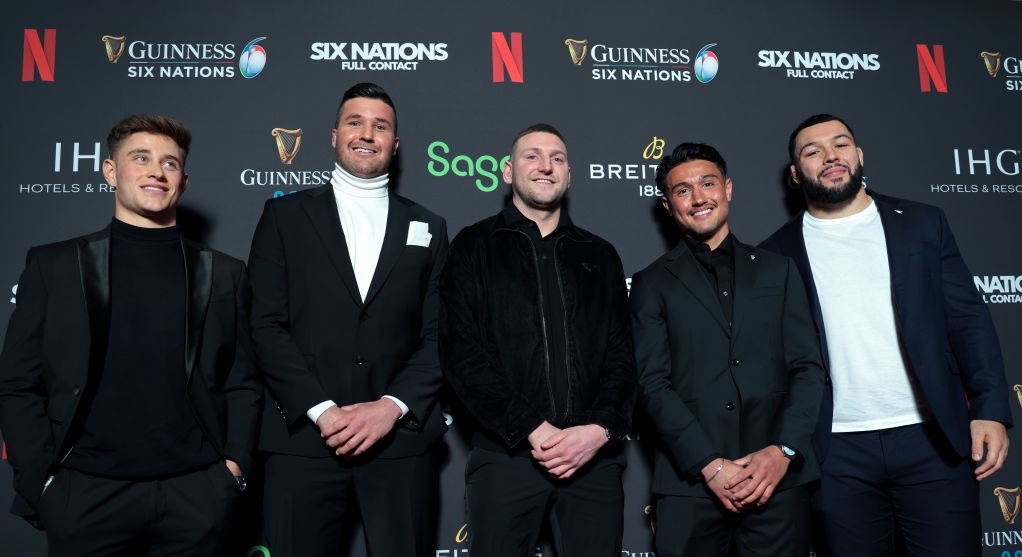Finn Russell on his 'jokey' Messi comment that has now gone viral

Finn Russell could never be described as shy and the Netflix producers clearly loved his openness with the opening episode released today (Wednesday) leading to a social media frenzy around his own comparisons with football great Messi.
Back in Edinburgh after the Netflix red carpet treatment, and readying for a pre-Six Nations camp with the Scotland squad in Spain, he was his usual laid back self, and laughed when asked if he was worried he had opened a can of worms by inviting comparisons with the Argentinian megastar.
“Similarities between me and Messi? What, really? We wear No 10 and that’s about it,” he laughed.
“I was asked to describe myself for a non-rugby fan, and I jokingly said I’d be like Messi if you were a football fan – and that’s just taken off by the looks of it. It’s seemed to get blown up out of the series, hasn’t it? Making headlines from a passing comment….”
Of course, Messi has won a World Cup, aged 35…?
“I know, I know. Shame I can’t say the same,” said the 31-year-old. “He’s certainly won a lot more trophies than I have. But I’ve got a couple more [World Cups] in me – two more to potentially get it. We’ll see. We need to win a Six Nations first, don’t we?
“It was just a kind of jokey comment, but I suppose you see the way he plays he sets up a lot of boys. I wouldn’t say I was at his level … but I suppose it’s a similar position!”
??'Cheers Netflix, you've done me over there!' ?
Is Finn Russell the Lionel Messi of rugby? ??? #BBCRugby pic.twitter.com/Vhe7pJLyoz
— BBC Sport Scotland (@BBCSportScot) January 24, 2024
The two do share the number 10 and while it is invidious anyway to compare rugby and football players’ on-field talents, many might suggest that Russell is to Scotland what Messi is to Argentina, in the sense of a player of rare skill who has the ability to unlock the best defences in the game and inspire a nation. Russell has made an immediate impact at his new club Bath, bringing a new attacking incision to their play, and while they weren’t able to knock over French giants Toulouse at the weekend, typically he feels he and his teammates took only confidence from the intensity of the game. Now, the former Racing 92 star remains confident of helping Scotland to compete for the Six Nations title in the coming weeks.
“My game has probably changed a little bit from going to England – it’s slightly different to France,” he said. “Maybe having a kid and growing up a bit has changed me as well.
“The World Cup was a learning curve for me, and then moving to another team, becoming the starting 10, solidifying my place and taking control of that team – that has changed me again. I’d say in the last 18 months there have been quite a few changes in my life, and that has maybe changed me as a player as well.”
The biggest challenge he faces in what will be his ninth Six Nations tournament, and first as captain, alongside Rory Darge, may be how he finds the freedom to conduct Scotland’s attack when so much analysis has been produced on him by each of the championship teams over the past decade. On one hand Scotland will attract envious glances from some opponents for having a very settled squad. On the other, does it mean there is little opportunity to surprise, Russell’s stock in trade?
“Having the team we’ve got, we’ve been playing together for the last few years so we’ve got that continuity,” he acknowledged. “I know what Sione is going to do outside of me; I know what Shuggy [Huw Jones] or Cam [Redpath] are going to do at 13; I know what Blair’s going to do – we’re all on the same page as each other.

“I know opposition coaches are analysing us and trying to work out how to break us down in defence and attack. They might know that I like to show and go on the inside or that I like short attacking kicks, but it comes down to us as individuals, seeing the space, picking the right options at the time; how we defend and us knowing what the opposition are going to do too.
“With modern technology and the analysis tools we’ve got you can look at everything from the last five years on how Scotland have played, but coming into this tournament we’ll be putting a few different things in place, a few different moves, some tactics that are going to be different.
“The first and second games are always hard to preview the opposition because you don’t know what will be changing, especially off the back of a World Cup.”
Of course, Russell and Scotland had a rude awakening at the recent World Cup as their attack was severely blunted by Ireland and South Africa. Ireland took a novel approach by doing the reverse of most other teams and, instead of putting several players on Russell, they stood off the fly-half just a little and gave him a fraction more time, before then sending runners swarming to the source of his pass.
“A lot of teams will have a look at the World Cup, a debrief on what went well, what went wrong and how it can get better, and the coach will have time away, going to other clubs and chatting to them,” agreed Russell.
“Definitely [we can learn from the Ireland defeat], and how we can get better from that, whether it’s the attacking side of it or the defensive side – as a whole but also individually. But it goes both ways. If they’re analysing us and how they can break us down, we’ll be analysing ourselves but also them. Every team does it and just because we’ve been together for a few years I don’t think it gives the opposition much of an advantage.
“I love people coming for me or trying to shut me down. As a 10 you’re always going to get hit after you pass. You’re the main playmaker and some teams think if you can shut the 10 down you can shut the attack down, which isn’t always the case. It can put you under more pressure but it will open space somewhere else. Then it’s just how quickly you can find that space and figure out their defensive system to then unlock it.”
For a moment, we see inside the astute tactical brain of Russell, but it doesn’t last long as captain or not he rarely loses his jokey side. The wide smile returns as he adds: “If a team decides to send someone through the middle to take out the 10 then I’ll figure out a way to counter that. It’s part of the fun of the game. You’re figuring out the defences as you go and you’ve got 80 minutes to do it. Whichever team manages to do it usually wins!”








































































